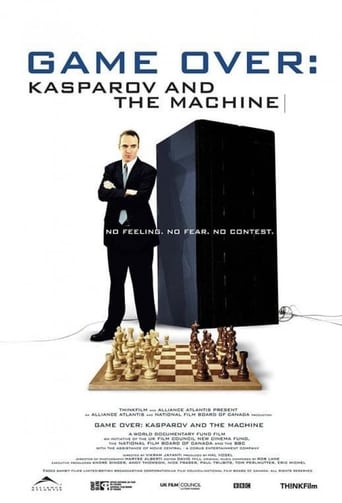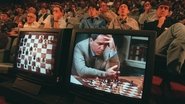siderite
As chess documentary go, this one is pretty good, even if far from being unbiased. Rather, it is biased both ways, trying to show both sides of the story, but throwing in enough innuendo to make it all seem either a terrible corporate conspiracy or an obstinate refusal to accept defeat from Garry Kasparov. Riddled with scenes from the 1927 film "Le joueur d'échecs", about The Turk, the wondrous mechanical chess player that turned out to be human operated, it doesn't take much to know which direction the film leaned towards.But if you ignore the dramatization, the film is quite filled with interesting information. It is great to see Kasparov explain how the computer strategy is different from a human player's and how the exponential nature of the calculations don't render themselves well to following a long term plan.What I didn't like is that it is not so much about chess itself. The games are not shown, no moves, no knowledge of the game is required in order to watch it. But, as documentaries go, this one was above average and I have to recognize it as such.
disdressed12
i was disappointed in this documentary.i thought it would be about the second chess match between Grandmaster Garry Kasporov and Deep Blue the supercomputer designed by IBM computer experts to beat any human chess player.Kasparov was and still is,considered the greatest chess player ever.the movie takes us back to 1997 where Kasporov had agreed to have a rematch with "deep Blue" after defeating it 1 year earlier.but instead of focusing on the game,it focuses more on what happens before and after.there are snippets of the game,but not very many.much of the film centers around Kasporov's paranoid obsession that the match was rigged as part of some conspiracy theory and that he lost the match unfairly.the movie also includes interviews with people who are not interesting in any way.they even chat with the manager of the building where the match took place.who cares?i also found it very dry and slow.ultimately this movie was unsatisfying.this is just my opinion,of course.if you like conspiracy theories,this movie might interest you.for people not into chess or conspiracy theories,this movie would probably have no value.i am a chess fan,and i only stuck it out because of that.i give"Game Over:Kasparov and the Machine" 4/10
Dhaval Vyas
Being an admitted chess addict, I was excited to see a documentary about the 1997 rematch between Garry Kasparov and IBM's Deep Blue supercomputer. I was hoping to see an in depth look at the match and a lot of what Kasparov had to say. Boy was I wrong and misguided by a mile. This documentary is a lot like many modern documentaries - there is a lot of flash but no real substance. After watching it, I am sad to say, I felt like I wasted my time. One of the most annoying aspects about the documentary is that it does not stay at one place for a decent period of time. It has the typical MTV type editing, where the camera shows different images and quick sound bites from people every five seconds. It is very sad that film-making has been watered down to the attention span of a 10-year old child.I understand it is difficult to make a film about chess, but that does not mean one should make it flashy. 'Game Over' did have a couple of interesting ideas though. It brought up the idea whether computers can think like human beings or not; whether computers have advanced to a unique new level. This is what Kasparov thought after the match, but this film does not go deep enough with this idea. Also, this film tries to bring in a bizarre theory. It tries to imply the paranoid that a human being was making the moves along with the help of the computer. Kasparov had suspicions about this, but still to this day there is no evidence. Towards the end of the film, it tries to imply the bizarre that maybe Anatoly Karpov might have been the human being who was secretly making the moves with the aid of Deep Blue. Interesting to think about, but I don't know how plausible or realistic it is. I still would not recommend this movie though, not even for chess addicts.
knight_armour
This documentary was neither professionally nor objectively made. The whole thing played out like a conspiracy theory by IBM to win the match in question just to make some money. Garry Kasparov has an ego problem. He was puffed up before the match and when he lost, he didn't like it. I remember playing chess against computers back in the 80s and it wasn't too difficult to win. As time went on, I started to lose and didn't like it. Today, I simply don't play against computers anymore because they're just too good. Not only that, the games are uninteresting and lack the appeal of human games, where both sides are more likely to err and open the game to exciting possibilities. This documentary keeps showing us images of The Turk which is an ancient chess playing automaton that was really controlled by a human being. From the start until the end we are lead to believe that IBM short of literally hid a human GM in the back of their cupboard-sized computer. I'm a computer scientist and take offense at the notion that just because Garry lost, IBM must have cheated. I know how computers play chess. It's not magic and it's no mystery. They can be trained, have huge amounts of chess knowledge and they most certainly see positions and possibilities in unprecedented detail compared to humans. It's really no surprise that Deep Blue won. Perhaps at the time it was. If it happened today, given the ever-increasing processing power of machines; people would hardly blink. If a machine couldn't at least draw with a GM today, people would think the program was weak.



